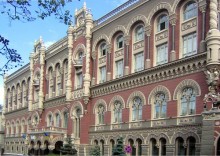The wage arrears in January 2014 have been 808.2 million hryvnias, reportedly by the State Committee of Statistics of Ukraine. Compared to December 2013, the figure has decreased (it was one billion hryvnias). Of course, this is good, but experts warn that the optimism is premature, because there are serious factors of risks now which cause economic threats.
So, it is expected that the trade deficit will be about 14.6 billion dollars, whereas it was 5.836 billion over nine months of 2013. This figure was mentioned in the macro data forecast for the current year in the governmental decree of December 18, 2013 (No. 978). And it has to be covered somehow. Because of internal confrontations, investors have halted their business plans. The cooperation with the IMF has not renewed. And budget revenues are falling, opposition MP Arsen Avakov told The Day. By his estimations, the shortfall is already 26 billion hryvnias. These figures have not been officially publicized, but there are problems with revenues, proof of which is the fact that Ukraine has requested Russia to postpone gas payments, which, according to the Russian side’s estimations make about 2.7 billion dollars.
The allotment of Russian money is up in the air. According to First Vice-Prime Minister of Russian Federation Igor Shuvalov, the negotiations on financial support and cooperation in the sphere of energy will renew as soon as the new government is formed in Ukraine. Answering the question on when the second tranche of loan to Ukraine will be provided, he said there had been no concrete agreements on this before the resignation of the Cabinet, and there are no agreements as yet. “Apart from the financial relations, agreements on energy, there are other plans, like cooperation in the sphere of industrial production, aircraft construction, shipbuilding, and nuclear energy. I judge by the fact that even before the full-fledged government of Ukraine is formed, the RF government will continue to work with its counterpart in this vein,” RF President Vladimir Putin said. Well, it is very convenient to work “in other spheres,” while Ukraine is looking for additional financial sources to budget, isn’t it?
What consequences should Ukrainians expect from the combination of these factors? The Day asked the president of the Center of Anti-Crisis Research Yaroslav ZHALILO about this.
“We have totally plunged into the second stage of influence of crisis phenomena in politics, which affect the economic sphere. The first one was connected with the negative influence on expectations of economic entities and average citizens, which resulted in increased demand for cash and instability in the banking sphere, which, it seems to me, has been stabilized for the time being. The second moment is connected with misbalancing of more essential macroeconomic tasks, fulfillment of which requests an efficient government and a consistent economic policy. Of course, the question of filling the budget is a key one, taking in account the fact that in Ukrainian regions where there have been problems with the work of oblast state administrations the problem of filling the budget has become more acute.
“If there is a treasury shortfall, the country will have shortages with financing of wages and problems with the work of state-run organizations. Whereas the situation is simpler with local budgets, especially Kyiv budget, because the KMDA is more or less functioning, other regions are going to feel this lack of financing more.
“Another thing is that the Russian loan does not play an essential role in stabilizing of the economic situation in Ukraine. Why? The volume of the loan is incommensurable with the sum needed to improve the economic situation in the country. Ukraine’s annual budget is about 400 billion hryvnias. If we divide this sum per 12 months, it will be over 40 billion a month. In this background the Russian money is a tangible sum, but the question of paying the IMF debt remains. And the payment should be made at the beginning of February 2013. I think Russian money should be used for this aim. So, it cannot in any way boost the economic situation in Ukraine, maybe just smooth certain problems. As for the entering of the international capital markets, it is clear to everyone: lack of stable policy and new government make investors uncertain about how they are supposed to build financial relations with Ukraine under these circumstances. China, with which Ukrainian government agreed on channeling considerable credit resources to economy, looks at us with a certain deal of distrust, too. And this is bad as well.”







